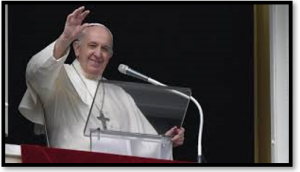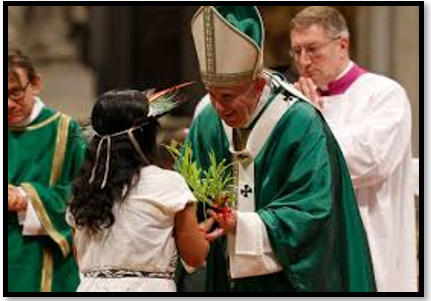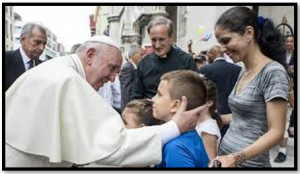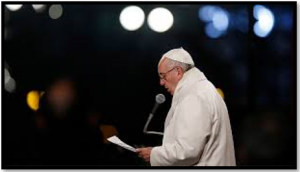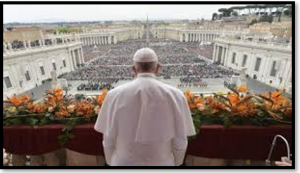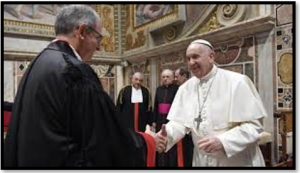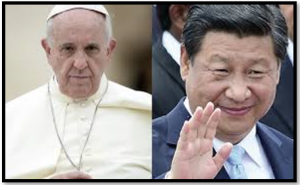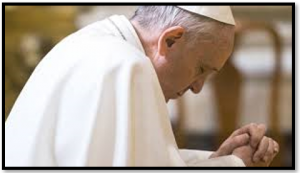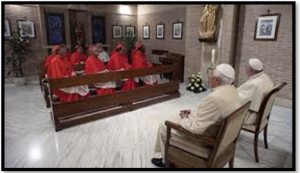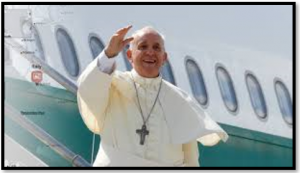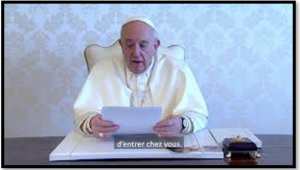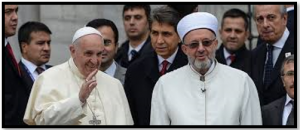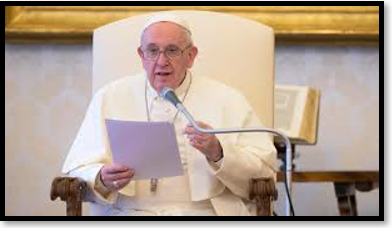
Prayer and the health crisis also return in the catecheses of the general audiences of the year 2020. The Pope dedicates an entire cycle to prayer that begins on May 6 and resumes on October 7. "Prayer is the breath of faith," "it is its most appropriate expression. Like a cry that comes from the hearts of those who believe and trust in God," the Pope teaches.
On the theme of "Healing the World," the Supreme Pontiff has been reflecting since August, recalling in particular, on Wednesday the 19th, the importance of universal access to vaccines. "How sad it would be to give priority to the richest! How sad it would be if this vaccine became the property of this or that nation and was not universal and for all".
A third cycle of catechesis, from January to the end of April, is instead devoted to the Beatitudes. Until December 31, there are 46 general audiences this year. They have been held in various places, depending on the more or less alarming health situation: St. Peter's Square hosted only one, on February 26, Ash Wednesday, while the other audiences were held in Paul VI Hall, in the Courtyard of St. Damascus or live from the Library of the Apostolic Palace, without the physical presence of the faithful.
The Angelus and Regina Coeli were also broadcast live from the Apostolic Palace Library from March to May. By December 31, 2020, the Pope will have recited the Marian prayer 58 times, an occasion to launch appeals for peace and solidarity in many countries that are victims of war or natural disasters. In this regard, the exhortation of July 19 prevails over all others: "I renew the call for an immediate global ceasefire, which will allow for the peace and security necessary to provide the necessary humanitarian aid.

In these times of pandemic, digital technology allows the Pope to express his closeness to suffering humanity: as from March 9 to May 18, it is forbidden for churches in Italy to celebrate Mass in public, the Supreme Pontiff has authorized the live broadcast of the Mass he presides each morning at 7 a.m. at Saint Martha's House. At the beginning of each celebration, the Pope prays for a specific category of people: the sick, the deceased, health care personnel, prisoners, the elderly, families, 'essential workers', artists, but also pastors and authorities called to make difficult choices.
In addition, as from March 9 to May 18, it is forbidden for churches in Italy to celebrate Mass in public, the Supreme Pontiff has authorized the live broadcast of the Mass that he presides each morning at 7 a.m. at Saint Martha's House. The last live broadcast takes place from St. Peter's Basilica on the morning of May 18, the centenary of the birth of St. John Paul II. Francis said he found in his predecessor "three signs of the Good Shepherd: prayer, closeness to the people and love of justice.
The year that compels humanity to social distancing is also the year of Pope Francis' third encyclical. On October 4th, "Fratelli Tutti", which takes its title from the "Admonitions" of St. Francis of Assisi, is published on the day the Church commemorates St. Poverello. In his encyclical, the Holy Father indicates fraternity and social friendship as the main means to build a better, more just and peaceful world, with the commitment of all. The document also offers the Pope the opportunity to reiterate his opposition to war and to recall that in a globalized world we can only save ourselves together.
But the year 2020 opened with the publication of another fundamental document, the Apostolic Exhortation "Querida Amazonia", the fruit of the Special Synod for the Amazon Region held in October 2019 at the Vatican. This text, released on February 12, represents Francis' desire to see the emergence of a Church with an Amazonian face, and traces new ways of evangelization and protection of the environment and the poor. In particular, the Pope calls for a new missionary impetus and encourages the strengthening of the role of the laity in ecclesial communities.
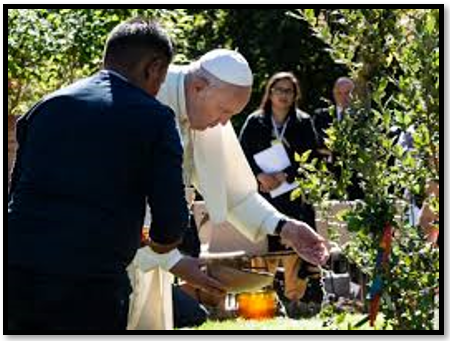
It is no coincidence that this year also marks the fifth anniversary of Pope Francis' second encyclical, "Laudato Si'", which was celebrated on June 18 with the document "On the Path of Caring for the Common Home", prepared by several dicasteries of the Holy See on integral ecology and aimed at challenging every Christian on a healthy relationship with Creation.
Then, on May 24, a special "Laudato Si' Year" was launched, while on December 12, Pope Francis sent a video message to the participants of the "High-Level Meeting of Caring for Climate 2020", the United Nations climate videoconference, to reiterate the Vatican's commitment to reduce net emissions to zero by 2050. It promises to intensify the management efforts undertaken to enable "rational use of natural resources, energy efficiency, sustainable mobility, reforestation and circular economy also in waste management".
As Bishop of Rome, on February 3, Francis signed a message for the 150th anniversary of the Italian capital, in which he wrote, "Rome will have a future if we share the vision of a fraternal, inclusive city, open to the world".
Among the Apostolic Letters of 2020 is the "Patris corde", published on December 8, 150 years after Blessed Pius IX declared St. Joseph the patron saint of the Catholic Church. The document describes the salient features of the putative father of Jesus, grasping the strength of an "unparalleled protagonist in the history of salvation" precisely because he remains "hidden" and "off-center" out of love for his Son and for Mary. The letter is accompanied by a decree from the Apostolic Penitentiary announcing a special "Year of St. Joseph" that will end on December 8, 2021.
During the Angelus of December 27th, Francis also announced that on March 19th, 2021, precisely on the Solemnity of the putative father of Jesus, the year "Amoris Laetitia Family" will be inaugurated, which will end on June 26th, 2022 with the 10th World Meeting of Families, to be held in Rome. This special year is intended to celebrate the fifth anniversary of the Apostolic Exhortation "Amoris Laetitia" on the beauty and joy of family love, signed by the Supreme Pontiff on March 19, 2016.
The year that is drawing to a close also bears witness to the special celebrations presided over by the Supreme Pontiff: on January 26, the Mass on the First Sunday of the Word of God, instituted by the Pope in 2019, is held in St. Peter's Basilica. "The Word that saves comes in our complexities, in our darkness. Today, as then, God desires to visit those places where we think he does not come," Francis assures us in his homily.
On the evening of April 10, less than a month before the prayer of March 27, St. Peter's Square offers the setting for another prayer, that of the Way of the Cross, written by the inmates of the "Due Palazzi" prison in Padua. At its conclusion, the Pope makes no speech, but his praying silence is stronger than any words. The same faith-filled silence accompanied him months later in the Spanish Steps in Rome: it was dawn on December 8, the Solemnity of the Immaculate Conception, and the masked Pope recollected himself in prayer at the feet of the statue of the Virgin Mary. He places a bouquet of white roses, as well as the hopes of all humanity.
At Easter, on April 12, Resurrection Sunday, the Vatican Basilica is empty: the Pope presides over a mass in the presence of very few people and pronounces the Urbi et Orbi before the Altar of Confession. On that day, the drama of Cabo Delgado, Mozambique attracted the attention of the international community. Among the various calls for peace that Francis makes in his Message to the City and to the World, Urbi et Orbi, one is dedicated to the North-Eastern province of the African country, the scene of three years of violent conflict. And at that moment, it was as if the Pope had put Cabo Delgado on the map of the world.
On November 22, the Solemnity of Christ the King, St. Peter's Basilica also hosts the ceremony for the presentation of the Marian Cross and Icon, symbols of World Youth Day, from the youth of Panama, the host country of WYD 2019, to the youth of Lisbon, the city that will host the event in 2023. For the occasion, the Pope established that the diocesan celebration of WYD be transferred from Palm Sunday to Christ the King Sunday.
From a reform point of view: In March, the Pope promulgated the law on the Vatican City State judicial system, which replaced the one in force since 1987, giving greater independence to magistrates and simplifying the system through a clearer separation between the public prosecutor's office and the judiciary. On June 1, it was the turn of the Motu proprio "Norms on transparency, control and competition in public procurement in the Holy See and Vatican City" that allows for better management of resources and reduces the danger of corruption. It will be followed, on December 18, by a Memorandum of Understanding on the fight against corruption, signed by the Prefect of the Secretariat for the Economy, Father Juan Antonio Guerrero, and by the Rev. General ad interim, Alessandro Cassinis Righini. The Commission for Reserved Subjects is appointed on October 5. It will have to establish, on a case-by-case basis, on which act of an economic nature it is necessary to maintain confidentiality. On December 5, the Pope approves in a Chirograph the new statute of the Financial Information Authority, which thus becomes the Supervisory and Financial Information Authority. Finally, on December 28th, with the Motu Proprio "On certain competencies in economic-financial matters", the management of funds and real estate of the Secretariat of State, including the Denarius of St. Peter, is transferred to APSA. This change in management, in a way announced last August in a letter addressed by the Pope to the Secretary of State, has been put in place by a "Special Commission of Passage and Inspection" instituted at the beginning of November to become operative on January 1. At the same time, the role of the Secretariat for the Economy is being strengthened. It will act as the Papal Secretariat for Economic and Financial Affairs
It is also important to note that on October 22, the Provisional Agreement between the Holy See and the People's Republic of China, signed in Beijing in 2018 and concerning the appointment of bishops, was renewed for two years. This was followed on November 24 by the appointment of a new prelate, Bishop Thomas Chen Tianhao, who will head the Diocese of Qingdao.
Also in November, on Tuesday, November 10, the "Report on the institutional knowledge and decision-making process of the Holy See regarding former Cardinal Theodore Edgar McCarrick" was published. Recognized as responsible for sexual abuse of minors and dismissed from the clerical state in 2019, the former cardinal is the subject of a vast dossier that the Secretariat of State is preparing at the request of the Pope. The Supreme Pontiff himself spoke about it during the general audience of November 11: "Yesterday the report on the painful case of former Cardinal Theodore McCarrick was published," he said, "I renew my closeness to the victims of all abuses and the Church's commitment to eradicate this evil.
It should be noted that on July 16, the Congregation for the Doctrine of the Faith published a Vademecum to accompany, step by step, those who will have to ensure the truth in cases of abuse of minors by a member of the clergy. The text is the fruit of the Meeting on the Protection of Minors in the Church held in the Vatican in February 2019.
Towards the end of the year 2020, the composition of the College of Cardinals changes: on November 28, during the seventh Consistory of his pontificate, Francis creates 13 new cardinals, calling them to their new position from the peripheries of the world: countries like Brunei and Rwanda are part of the "geography" of the College of Cardinals for the first time. On that day, the Pope exhorted the members of the Sacred College not to give in to "corruption in priestly life" so that "the purple red of the cardinal's habit, which is the color of blood" would not become "for the spirit of the world, that of eminent distinction". The Consistory was held according to the health norms in force with several cardinals following the rite behind their screens, thanks to a live internet broadcast
In addition, 2020 is a year without international trips of the Pope, the trip to Malta at the end of May is postponed. Francis only travels to Italy. On February 23rd, he went to Bari for the meeting of reflection and spirituality "Mediterranean, frontier of peace": from the Basilica dedicated to St. Nicholas, the Pope invoked peace and fraternity, because war "is a madness to which one cannot resign oneself. It is a folly to which one can never resign oneself. On October 3, Francis went to Assisi on a private visit and there, at the tomb of the Poverello, he signed the encyclical Fratelli Tutti, published the following day.
During these twelve months, the Holy Father recorded many video messages, including those of April 3, September 25 and December 10. The first is dedicated to families, in view of Easter: in the most critical phase of the confinement, the Pope speaks with the tenderness of a father. "I thank you for allowing me to enter your homes. Make a gesture of tenderness towards those who suffer, towards children and the elderly. Tell them that the Pope is near and pray that the Lord will soon free us from all evil. On September 25, Francis addressed the 75th General Assembly of the United Nations and issued a strong warning to the international community to put an end to the arms race, protect the rights of migrants and rethink economic and financial systems. He also strongly condemned abortion as "an essential humanitarian service". The third video message is addressed to the participants of the meeting, promoted online by the Dicastery for the Service of Integral Human Development, on the crisis in Syria and Iraq. "Francis stressed: "We must ensure that the Christian presence in these lands continues to be what it has always been: a sign of peace, progress, development and reconciliation among persons and peoples.
And it is precisely Iraq that projects the pontificate of Francis around 2021: on December 7, the Pope's trip to Iraqi soil from March 5 to 8 was announced. It is a visit that the Primate of Italy is eagerly awaiting, so much so that he expressed his intention to make it as early as June 2019, during the audience with the participants in the Meeting of the Works of Aid to the Oriental Churches (ROACO). "An insistent thought accompanies me when I think of Iraq so that the country can move forward through peaceful and shared participation in the construction of the common good of all components of society, including the religious components," he said at the time. And a signal in this direction came on January 25, 2020, when the Pope received in the Vatican Barham Salih, President of the Republic of Iraq. It is therefore up to this country to build a bridge between the year that is passing and the next one that is coming, bringing new hopes.


